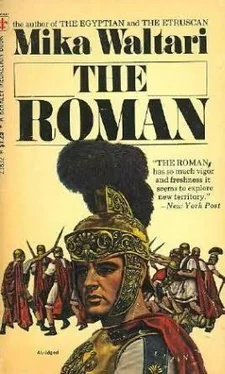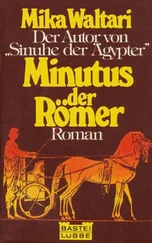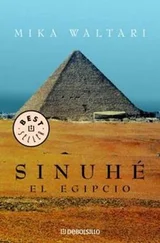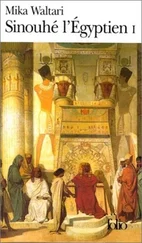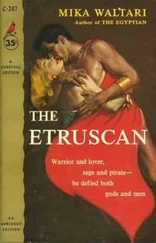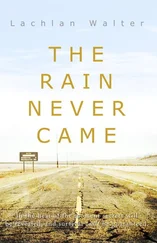Mika Waltari - The Roman
Здесь есть возможность читать онлайн «Mika Waltari - The Roman» весь текст электронной книги совершенно бесплатно (целиком полную версию без сокращений). В некоторых случаях можно слушать аудио, скачать через торрент в формате fb2 и присутствует краткое содержание. Жанр: Исторические приключения, на английском языке. Описание произведения, (предисловие) а так же отзывы посетителей доступны на портале библиотеки ЛибКат.
- Название:The Roman
- Автор:
- Жанр:
- Год:неизвестен
- ISBN:нет данных
- Рейтинг книги:4 / 5. Голосов: 1
-
Избранное:Добавить в избранное
- Отзывы:
-
Ваша оценка:
- 80
- 1
- 2
- 3
- 4
- 5
The Roman: краткое содержание, описание и аннотация
Предлагаем к чтению аннотацию, описание, краткое содержание или предисловие (зависит от того, что написал сам автор книги «The Roman»). Если вы не нашли необходимую информацию о книге — напишите в комментариях, мы постараемся отыскать её.
The Roman — читать онлайн бесплатно полную книгу (весь текст) целиком
Ниже представлен текст книги, разбитый по страницам. Система сохранения места последней прочитанной страницы, позволяет с удобством читать онлайн бесплатно книгу «The Roman», без необходимости каждый раз заново искать на чём Вы остановились. Поставьте закладку, и сможете в любой момент перейти на страницу, на которой закончили чтение.
Интервал:
Закладка:
I looked sympathetically at my father and said, “I cannot blame you ~ for your superstition, for the magic arts of the Jews have confused the heads of wiser men than you. Without doubt the goblet has brought success and wealth to you, but I wish to say nothing about immortality, for I don’t want to hurt you. And as far as a new god is concerned, there are old gods who have died and returned, such as Osiris and Tammuz and Attis and Adonis and Dionysius, not to mention many others. But all these are but parables and tales which those initiated into the mysteries revere. Educated people no longer drink blood and I have had more than enough of mysteries, thanks to stupid girls who hang colored ribbons in the bushes.”
My father shook his head and pressed his hands together. “Oh, if only I could make you understand,” he said.
“I understand only too well, even if I am not fully grown,” I assured him. “I have, after all, learned something here in Antioch. You talk about Christ, but the new superstition is even more pernicious and shameful than the other teachings of the Jews. It’s true he was crucified, but he was by no means a king and neither did he rise from the dead. His disciples stole his body from the tomb so that they would not be ashamed before the people. It is not worth talking about him. The Jews see to all the talking and the bickering.”
My father began to argue the matter with me.
“He was truly a king,” he said. “It was even put in three languages on his cross. Jesus of Nazareth, King of the Jews. I read it with my own eyes. If you don’t believe the Jews, then you must believe the Roman governor. And his disciples did not steal his body, even if the Jews did bribe the guards to say so. I know that because I myself was there and saw it all with my own eyes. And once I met him myself, on the east shore of the lake of Galilee, after he had risen from the dead. At least, I still believe that it was he. It was he himself who led me to find your mother. She at that time was having trouble in the city of Tiberias. Admittedly, sixteen years have passed since these events, but I can still see them clearly before my eyes when you upset me by your inability to understand.”
I could not afford to make my father angry with me.
“I don’t wish to argue with you about divine matters,” I said hastily. “There is only one thing I want to know. Can you return to Rome whenever you wish? Timaius maintained that you can never return to Rome because of your past.”
My father stiffened, frowned and looked sternly at me.
“I am Marcus Mezentius Manilianus,” he said, “and I can certainly return to Rome whenever I wish. I am not an exile and Antioch is no place of banishment. You should know that yourself. But I have my own private reasons for not going to Rome. Now I should be able to do so, if forced to, now that I am elderly and no longer as receptive to influences as I was when I was younger. Other reasons you need not ask about. You would not understand them.”
I was pleased with his assurances and cried, “You spoke of a dividing of the ways and my future which I myself must choose. What were you thinking about?”
My father wiped his forehead hesitantly, weighed his words carefully and finally said, “The men here in Antioch who know the way best have nowadays begun to realize that the kingdom does not belong only to the Jews. I suspect, or to be quite honest, I know, that even uncircumcised Greeks and Syrians have been baptized and allowed to take part in their meals. This has aroused many disputes, but at the moment there is a Jew here from Cyprus whom I once met in Jerusalem. He has with him, as his helper, a Jew called Saul, from Tarsus, whom I had also seen during his time in Damascus, once when he was led into the city. He had lost his sight during a divine revelation, but later it was returned to him. He is a man worth meeting. My dearest wish is that you should seek out these men and listen to their teachings. If they can convince you, they will baptize you as a subject of the kingdom of Christ and you will be allowed to partake in their secret meals. That is, without circumcision, for you need not fear coming under the jurisdiction of Jewish law.”
I could not believe my ears.
“You really wish me to be initiated into Jewish rites?” I cried. “To worship some crucified king and a kingdom that doesn’t exist? What else can one call something one cannot see?”
“The fault is mine,” my father said impatiently, “and I am sure I am using the wrong words, as I cannot convince you. Anyhow, you would have nothing to lose by listening to what these men have to say.”
But the very thought filled me with fear.
“I’ll never let the Jews sprinkle their consecrated water over me,” I cried. “And neither will I agree to drink blood with them. Then I’d lose the last remaining shreds of my good reputation.”
Once again my father tried patiently to explain that in any case Saul was an educated man and a Jew who had been to the school of rhetoric in Tarsus, and not only slaves and craftsmen, but also many noble ladies in Antioch secretly went to listen to him. But I put my hands over my ears, stamped my foot, and cried shrilly and uncontrollably, “No, no, no!”
My father returned to his senses and said in colder tones, “The choice lies with you. The learned Emperor C laudius has no doubt calculated that next spring it will be eight bundled vents since the foundation of the city. To be sure, the god Augustus celebrated this centenary, and there are many people still alive who joined in. But another centenary feast will give us an excellent lenson for going to Rome.”
Before he even had time to finish, I had flung my arms around his neck, kissed him, cried aloud in delight and rushed round the room, for I was still but a boy. Then his freedmen began to arrive for the feast and he had to go out into the hall to greet them and receive their gifts. I stood beside my father as a sign that he meant to stand by me in all things. They were very pleased about this, stroked my hair, consoled me over the loss of my horse and admired my bandages.
When they were lying at table and I was sitting on a stool at my father’s feet, since I was still a minor, my father explained that the point of this meeting was a family consultation about my future.
“Let us begin by fortifying ourselves with wine. Wine loosens the tongue, and we need all the good advice we can get.”
He did not sprinkle wine onto the floor, but Barbus was not frightened by this atheism. He made an offering to the gods instead and pronounced the greeting in a loud voice. I followed his example and the freedmen too sprinkled at least a drop of wine onto the floor with their fingertips, even if they said nothing aloud. My heart swelled with love when I saw them all, for all of them had done their best to spoil me and wished that I should grow up into a man with whose reputation their reputation too would grow. They expected nothing more from my father, for they had already become used to him.
“When I had bought your freedman’s staves,” my father continued, “I let you drink of the wine of eternity from my late wife’s wooden goblet. But you never began to assemble your riches, save for the mundane things of this world, which can come to an end at any moment. Yet that is only as it should be, for I should be tormented by my satiety and my wealth and the many useless works which I do not value at all. I wish for nothing but to live quietly and humbly.”
The freedmen hurried to assure him that they too tried to live as quietly and humbly as was possible for successful businessmen. Boasting about one’s wealth only led to increases in tax and obligatory donations to the city. And none of them wished to boast about the past when they had been slaves.
Читать дальшеИнтервал:
Закладка:
Похожие книги на «The Roman»
Представляем Вашему вниманию похожие книги на «The Roman» списком для выбора. Мы отобрали схожую по названию и смыслу литературу в надежде предоставить читателям больше вариантов отыскать новые, интересные, ещё непрочитанные произведения.
Обсуждение, отзывы о книге «The Roman» и просто собственные мнения читателей. Оставьте ваши комментарии, напишите, что Вы думаете о произведении, его смысле или главных героях. Укажите что конкретно понравилось, а что нет, и почему Вы так считаете.
